![]()
There are certain positive developments in Pakistan that I wished to extend my solidarity with as a liberal from across the Indo-Pak border. But as I set out to write this piece, we had the news of the arrest of an Indian on espionage charges in Balochistan, fanning hatred in both Pakistan and India. Apart from this, we had some sad news coming in at the global level from Brussels, the Ivory Coast, and the blasts in Lahore on Easter.
However, negativity has to be fought with positivity. We, the liberals, have to move forward with our actions to defeat the agenda of those coming in our way rather than feel pessimistic and bogged down.
To work towards creating a terror-free climate in South Asia before the Kashmir issue can be negotiated upon would also give Pakistan the opportunity to raise its concerns about the alleged Indian interference in Balochistan.
At the same time, the Pakistani establishment must look into its own blunders in Balochistan. Pakistanis citing reports of international human rights organisations in India-administered Kashmir, often shy away from believing reports from the same organisations about human rights violations.
The Supreme Court of Pakistan has also recognised human rights violations in Balochistan. It’s a given Balochistan has a complex history. Out of a basic commitment to human rights values, I would suggest that the 15 point resolution on Balochistan should be adopted by the Supreme Court Bar Association. This resolution was supported by various Pakistani political parties, but it should be implemented right away.
Moving on from these unfortunate events, first and foremost, I must make clear that the acknowledgement of Pakistan’s positive developments is not in any way written out of a patronising desire. In fact, as someone who has been committed to human rights globally, as well as one who bears a personal attachment to South Asia, I am writing this piece as a genuine appreciation for whatever has happened in the spirit of solidarity with the liberal and progressive forces in your country.
Of course, much more needs to be done to make Pakistan a better place and the same applies for India. I am just as aware that my country, India, also has a long way to go in eliminating socio-political identity clashes based on religion and other factors, as well as ensuring that the rights of women and the poor are safeguarded.
1. Firstly, I offer the heartiest of congratulations on the hanging of Salman Taseer’s killer. Although, as unfortunate as it is that many Pakistanis have bestowed upon him the halo of martyrdom, the enforcement of the death penalty in this case acts as an indicator that the law does not spare violent extremists, whether they act against minorities or against those who speak up for them. However, to reinforce this sentiment, the blasphemy law under Section 295-C of the Pakistan Penal Code needs to be repealed once and for all:
“295-C: Use of derogatory remarks, etc., in respect of the Holy Prophet:
Whoever by words, either spoken or written, or by visible representation or by any imputation, innuendo, or insinuation, directly or indirectly, defiles the sacred name of the Holy Prophet Muhammad (PBUH) shall be punished with death, or imprisonment for life, and shall also be liable to fine.”
Section 295-A of the Pakistan Penal Code on outraging religious sentiments can stay for the time-being and its existence can be cited as a valid reason to do away with the unnecessary additional blasphemy law. The Indian counterpart of this section exists till today, which Jinnah played a role in drafting. He made clear that a well-researched academic critique of a historical figure regarded as a prophet would
not be punishable under that provision.
“295-A: Deliberate and malicious acts intended to outrage religious feelings of any class by insulting Its religion or religious beliefs:
Whoever, with deliberate and malicious intention of outraging the 'religious feelings of any class of the citizens of Pakistan, by words, either spoken or written, or by visible representations insults the religion or the religious beliefs of that class, shall be punished with imprisonment of either description for a term which may extend to ten years, or with fine, or with both.”
Also, a climate must be created wherein Pakistani non-Sunnis in rural areas don’t feel pressurised into fleeing the country. This can only be achieved by creating a blanket of
security for minorities through urgent police reforms and an overall improvement in law-and-order machinery. Pakistani Christians, who had migrated to Thailand and who now face harsh circumstances, should be asked to come back once the blasphemy law is repealed. They should also be duly compensated for being subjected to persecution.
2. Another positive development in your country has been the introduction of a
marriage registration law for your Hindu minority, which had unfortunately been non-existent earlier. Pakistan has also resisted the pressure from the patriarchs of the Hindu community to
remove the divorce clause from the act, which is commendable. Earlier, it would be almost impossible for
Pakistani Hindus to prove that they are married, allowing Muslim extremists to exploit Hindu women, particularly by
forcing them into marriages.
The widows found themselves in the worst of circumstances as they did not have a hold of any valid document that could serve as evidence. There were
three failed attempts in 2008, 2011 and in 2014, after which in 2016, the bill has been passed by the Sindh assembly as well.
The Punjab assembly is still due to pass this bill, which should happen as soon as possible, followed by all other provinces, even those with a small Hindu population. However, it must be noted that this bill
contains a clause that invalidates the marriage when any of the spouses convert – this is problematic, given the history of forced conversions of Hindu girls to Islam in rural areas.
As opposed to annulment of marriage, why not file for divorce on the basis of conversion? These measures should be taken as soon as possible; else, this new legislative proposal may partially defeat the very purpose it has set out to achieve.
In Pakistan, the positive role of religious minorities in nation-building is being emphasised in
school textbooks is, no doubt, a step in the right direction. Even so, more needs to be done in this regard in terms of employing education as a medium to dispel prejudices based on religious identity.
The proposal for allowing the minority religious groupings in Pakistan to
observe holidays on their festivals is also a great initiative.
I must also state that while I welcome these developments, I was not even remotely aware of minority problems in Pakistan, serious as they indeed are. I am now also aware that you have produced prominent public figures from the
minority communities.
3. The progress you have made in promoting women and their rights is outstanding. To start with, congratulations on your
women’s cricket team triumphing over India in the T20 World Cup. The success of your women’s team have inspired
more girls to take part in sports, according to your captain Sana Mir – who, by the way, like many other Pakistani women, is
fond of Indian sarees. Also this instance from the match between our women’s teams is truly heart-warming and reflects the true spirit of sportsmanship.
[caption id="" align="alignnone" width="525"]
![]()
Photo: Cricket Addictors Facebook page.[/caption]
Shahid Afridi, who
had contended that Pakistani Pakhtun girls are only best at cooking, would do well to reconsider his position, given
their defeat on the same day and the long history of excellent male cooks in Muslim societies. How about him trying his hand at preparing biryani for the women’s team? Also, he should probably acknowledge just how smart they are proving themselves, the
girls from Peshawar that came up with brilliant biotechnological devices being testament to that.
Your country has indeed preceded ours in having women as fighter-pilots and paratroopers. Your former Foreign Minister,
Hina Rabbani Khar, a woman, also made quite a fashion statement in India. Both our countries have had a woman as the prime minister. Your country has also introduced reservations for women in legislatures, something India is also trying to achieve.
The passing of the
Women’s Protection Act in Punjab has also been a great milestone to protect women from domestic violence or expulsion from their homes. Indeed, the human rights commission and other such bodies must ensure that it is implemented to the tee. It is good that the law also carries a penalty for women filing false complaints. This law should be introduced all across your country.
Furthermore, a Pakistani filmmaker Sharmeen Obaid Chinoy won Oscars for documentary films
raising its voice for the female victims of acid attacks, and honour killings in Pakistan. The existence of such problems in the developing world is not unknown to westerners, but the efforts in trying to make a difference needs to be applauded, which Chinoy has done with her films by bringing the issues to a global platform.
Besides, when it comes to human suffering, help and support from activists from all quarters should be welcome – with awareness, comes a more resounding voice for change. For this reason, it shouldn’t be seen through the prism of
national shame. Also, if a foreigner like Brandon Stanton can be
internationally appreciated for speaking up for Pakistani victims (in his case, of bonded labour), then why not Chinoy?
4. Also, congratulations on your parliament building being the first to run
entirely on solar power!
However, despite all your achievements, there is a pressing matter that magnifies day by day. On behalf of all those Indians who wish for the same in our own country, your country and elsewhere, I must say that we shall, without compromising our national security, fight all those jingoistic and extremist tendencies that have spiralled uncontrollably.
The sheer display of barbarity in the
attacks in Brussels as well as the
airports of Karachi and
Peshawar, amongst many others that have taken place in the name of jihad is one that collapses the heart and makes us all feel defeated in the fight for humanity.
As an Indian citizen, I would particularly emphasise that we, Indians, would like to see the perpetrators of the
26/11 Mumbai attacks convicted. Although we do appreciate the headway made in the investigations in this matter by Pakistani officers, as your officer Tariq Khosa had also pointed out,
“The case has lingered on for far too long.”
We want nothing more than this to finally come to an end, with the perpetrators being enforced their due punishment.
Furthermore, just like in the case of Salman Taseer’s killer, exemplary punishment needs to be meted out to those in Pakistan who have inflicted acts of terror upon innocent civilians
in India, Afghanistan and Iran, which can pave the way for the resolution of disputes and a peaceful, prosperous South Asia.
It’s not sufficient to condemn these atrocities, but we should develop an ideological roadmap to rebut all those illiberal tendencies that culminate in these disgusting acts of violence against innocent civilians. In that same process, we should base our conflicts on verified facts rather than
exaggerated extremism on the other side of the border and equally melodramatic rhetoric from the ‘intellectuals’ of our countries, as all that promotes is hatred.
To all the liberals in Pakistan seeking rationalism, humanism, gender equality, a scientific temperament and a climate for productivity in fields like art and sport, I must say, congratulations! You have indeed achieved some milestones in the recent past. Lets keep the momentum going and keep heading in the right direction, as should all of us.



 So maybe we have issues, but do we really hate each other?
I ventured (bore blisters, both physical and mental) to ask this question obsessively. From friends, family, colleagues, acquaintances, staff, domestic help and a sea of potentially fake accounts and robots on Twitter- everyone was hounded for their opinion.
The start was more enthusiastic than I had hoped for.
So maybe we have issues, but do we really hate each other?
I ventured (bore blisters, both physical and mental) to ask this question obsessively. From friends, family, colleagues, acquaintances, staff, domestic help and a sea of potentially fake accounts and robots on Twitter- everyone was hounded for their opinion.
The start was more enthusiastic than I had hoped for.
 KR, a friend I rung in the other part of the world (for varying perspective) recalled a time she consoled a friend.
KR, a friend I rung in the other part of the world (for varying perspective) recalled a time she consoled a friend.

 Photo: Facebook page (https://www.facebook.com/pages/Beautiful-Teen-Boys-Of-Pakistan/234868620019613)[/caption]
Photo: Facebook page (https://www.facebook.com/pages/Beautiful-Teen-Boys-Of-Pakistan/234868620019613)[/caption] Photo: Facebook page (https://www.facebook.com/pages/Beautiful-Teen-Boys-Of-Pakistan/234868620019613)[/caption]
Yup, you guessed it!
Photo: Facebook page (https://www.facebook.com/pages/Beautiful-Teen-Boys-Of-Pakistan/234868620019613)[/caption]
Yup, you guessed it!  Photo: Facebook page (https://www.facebook.com/pages/Beautiful-Teen-Boys-Of-Pakistan/234868620019613)[/caption]
Our existence does not just mean a healthy body; we need a
Photo: Facebook page (https://www.facebook.com/pages/Beautiful-Teen-Boys-Of-Pakistan/234868620019613)[/caption]
Our existence does not just mean a healthy body; we need a 
 Photo: Sameera Rashid[/caption]
On a winding road from the Chakdara to Mingora, people are seen crossing the clear waters of river Swat, on makeshift bridges, and plum trees with delicate pink flowers bloom on the roadside orchids.
[caption id="" align="alignnone" width="590"]
Photo: Sameera Rashid[/caption]
On a winding road from the Chakdara to Mingora, people are seen crossing the clear waters of river Swat, on makeshift bridges, and plum trees with delicate pink flowers bloom on the roadside orchids.
[caption id="" align="alignnone" width="590"] Photo: Sameera Rashid[/caption]
Not only does
Photo: Sameera Rashid[/caption]
Not only does  Photo: Sameera Rashid[/caption]
The construction boom of schools in Swat belies the image of a
Photo: Sameera Rashid[/caption]
The construction boom of schools in Swat belies the image of a  Photo: Sameera Rashid[/caption]
After the partial reconstruction work, the school was re-opened in 2012. Some parts of the school, however, such as the gymnasium and auditorium are still under construction. As I took round of the school, beautiful girls, smartly dressed in their uniforms, with their hair neatly tied in ponytails, sang poems, in Urdu and English, with full gusto and enthusiasm. The younger girls synchronised their hand movements animatedly to convey the meaning of the poems.
The students of the middle and senior sections were perfectly fluent in English. The school principal, Sister Greta Gill, explained that when the girls are admitted in the nursery section, they can only converse in Pashto, but gradually, they become fluent in both Urdu and English.
[caption id="" align="alignnone" width="337"]
Photo: Sameera Rashid[/caption]
After the partial reconstruction work, the school was re-opened in 2012. Some parts of the school, however, such as the gymnasium and auditorium are still under construction. As I took round of the school, beautiful girls, smartly dressed in their uniforms, with their hair neatly tied in ponytails, sang poems, in Urdu and English, with full gusto and enthusiasm. The younger girls synchronised their hand movements animatedly to convey the meaning of the poems.
The students of the middle and senior sections were perfectly fluent in English. The school principal, Sister Greta Gill, explained that when the girls are admitted in the nursery section, they can only converse in Pashto, but gradually, they become fluent in both Urdu and English.
[caption id="" align="alignnone" width="337"] Photo: Sameera Rashid[/caption]
The classrooms were visually pleasing and tastefully decorated with artwork, maps, murals, stuffed toys and models of stars, comets and planets. The windows were not draped with curtains, as is the practice in all schools, and you could view the misty clouds hanging low over mountain peaks right outside the class windows.
[caption id="" align="alignnone" width="600"]
Photo: Sameera Rashid[/caption]
The classrooms were visually pleasing and tastefully decorated with artwork, maps, murals, stuffed toys and models of stars, comets and planets. The windows were not draped with curtains, as is the practice in all schools, and you could view the misty clouds hanging low over mountain peaks right outside the class windows.
[caption id="" align="alignnone" width="600"] Photo: Sameera Rashid[/caption]
When I asked the girls in ninth grade about their career aspirations, all of them replied in a chorus that they wanted to become doctors. However, as I prodded a little more, three girls added, after some hesitation that, they want to become army officers, and one chipped in, to my utter surprise that, she wished to become a cricketer like Shahid Afridi. So, apart from the conventional vocation of medicine, some girls were also striving to enter male-dominated professions.
Then, I put another question to the class, I asked if they liked
Photo: Sameera Rashid[/caption]
When I asked the girls in ninth grade about their career aspirations, all of them replied in a chorus that they wanted to become doctors. However, as I prodded a little more, three girls added, after some hesitation that, they want to become army officers, and one chipped in, to my utter surprise that, she wished to become a cricketer like Shahid Afridi. So, apart from the conventional vocation of medicine, some girls were also striving to enter male-dominated professions.
Then, I put another question to the class, I asked if they liked  Photo: Sameera Rashid[/caption]
Then I asked them to explain why they felt this way about
Photo: Sameera Rashid[/caption]
Then I asked them to explain why they felt this way about 






 2015 was no different from the previous years if we talk about the morning shows in Pakistan.
2015 was no different from the previous years if we talk about the morning shows in Pakistan. 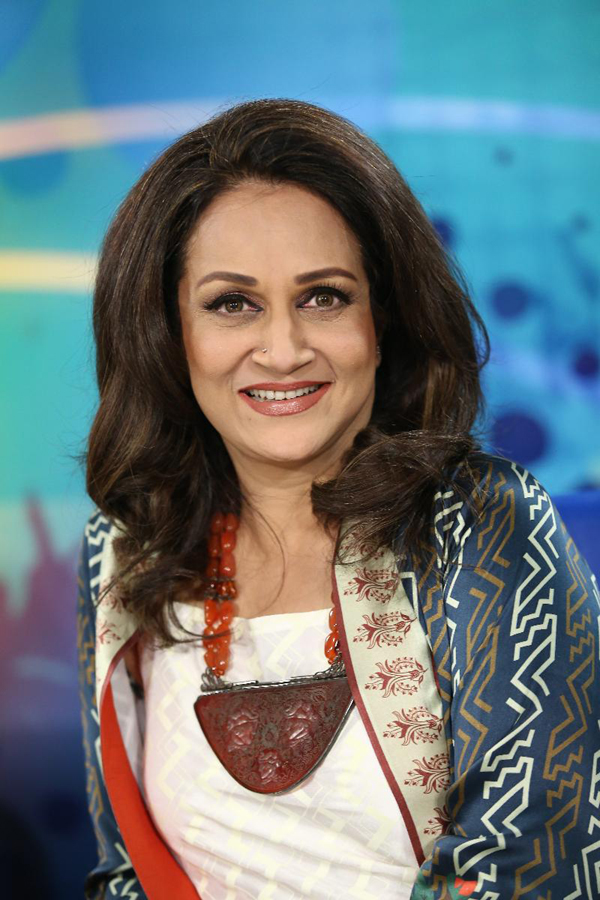 Photo: Facebook[/caption]
2015 left us with some realisations that no matter how much we like to watch morning shows or we simply loathe them, to be a morning show host is no easy job. It looks all fun and no work but it in reality it requires a lot of hard work and consistency and not everybody can be a good morning show host. We witnessed Bushra Ansari do a morning show for Geo TV for a couple of months. From Aangan Terha to Loose Talk to Saima Chaudhary, we know the versatility in acting Ansari is gifted with but that couldn’t work with being a morning show host. Similarly former news anchor, Madiha Naqvi couldn’t perform well as a morning show host for all.
3. Wedding weeks
From chiffon lehengas to well-coordinated dancing, the
Photo: Facebook[/caption]
2015 left us with some realisations that no matter how much we like to watch morning shows or we simply loathe them, to be a morning show host is no easy job. It looks all fun and no work but it in reality it requires a lot of hard work and consistency and not everybody can be a good morning show host. We witnessed Bushra Ansari do a morning show for Geo TV for a couple of months. From Aangan Terha to Loose Talk to Saima Chaudhary, we know the versatility in acting Ansari is gifted with but that couldn’t work with being a morning show host. Similarly former news anchor, Madiha Naqvi couldn’t perform well as a morning show host for all.
3. Wedding weeks
From chiffon lehengas to well-coordinated dancing, the 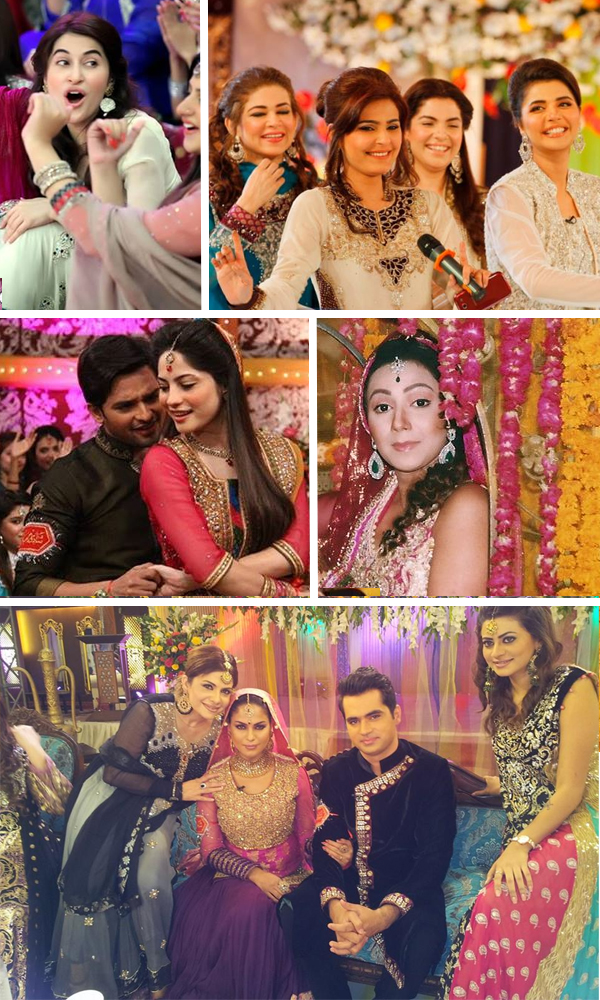 Many morning shows have these themes as a permanent part of their show that is stretched upon weeks at times instead of just one week. I have been trying to comprehend the purpose of these themes since their inception and my constancy at failing is parallel to the consistency with which these themes are repeated and adapted by even more channels.
Maybe, the idea of getting married is alien to our people and their morning shows are just trying to help get the people acquainted with the very concept of ‘marriage’. How I utterly fail to understand the need of such shows.
4. Let’s remarry the already married
Some morning show hosts try to innovate upon the brilliant idea of showing a wedding on a live show that they somehow convince celebrity couples who have already been married for years to play as bride and groom and then happens the re-enactment of the big day just to literally re- live their memories.
5. Any expecting celebrities around? Let’s throw them a baby shower.
There have been days when morning show hosts are tired of their jobs and need to do something to fill the two hour slot, they get paid for. So they scout for a belly with a bump in Pakistan’s land of fame. If the hunting succeeds, they kick off the celebrations for the mom-to-be. The set is painted all pink if it’s a girl, blue if it’s a boy and a mix of both if the gender is still a secret.
https://www.youtube.com/watch?v=4Wrc9yFHaWw
6. Mirror mirror on the wall, which morning show make girls fairest of them all?
A woman cherishes her beauty and that certainly is her right. But does beauty necessarily mean to be as white as snow? If any part of Pakistan was left uncontaminated with the flawed notion of
Many morning shows have these themes as a permanent part of their show that is stretched upon weeks at times instead of just one week. I have been trying to comprehend the purpose of these themes since their inception and my constancy at failing is parallel to the consistency with which these themes are repeated and adapted by even more channels.
Maybe, the idea of getting married is alien to our people and their morning shows are just trying to help get the people acquainted with the very concept of ‘marriage’. How I utterly fail to understand the need of such shows.
4. Let’s remarry the already married
Some morning show hosts try to innovate upon the brilliant idea of showing a wedding on a live show that they somehow convince celebrity couples who have already been married for years to play as bride and groom and then happens the re-enactment of the big day just to literally re- live their memories.
5. Any expecting celebrities around? Let’s throw them a baby shower.
There have been days when morning show hosts are tired of their jobs and need to do something to fill the two hour slot, they get paid for. So they scout for a belly with a bump in Pakistan’s land of fame. If the hunting succeeds, they kick off the celebrations for the mom-to-be. The set is painted all pink if it’s a girl, blue if it’s a boy and a mix of both if the gender is still a secret.
https://www.youtube.com/watch?v=4Wrc9yFHaWw
6. Mirror mirror on the wall, which morning show make girls fairest of them all?
A woman cherishes her beauty and that certainly is her right. But does beauty necessarily mean to be as white as snow? If any part of Pakistan was left uncontaminated with the flawed notion of 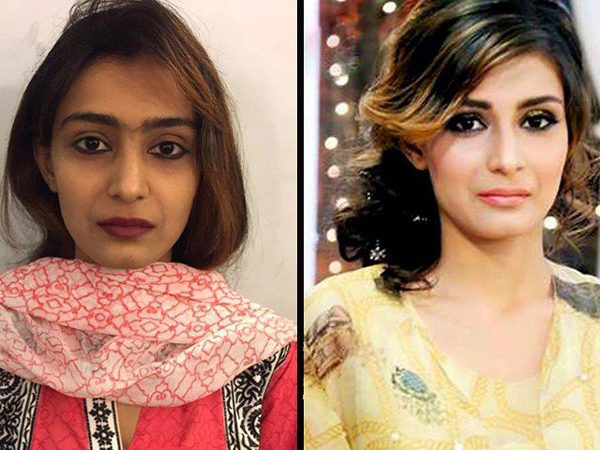 Photo: Facebook[/caption]
[caption id="" align="alignnone" width="600"]
Photo: Facebook[/caption]
[caption id="" align="alignnone" width="600"]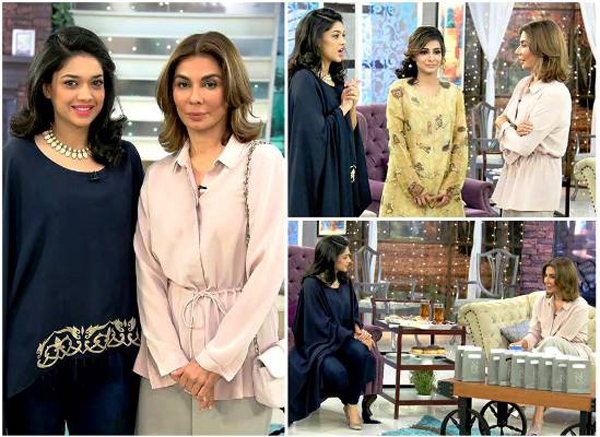 Photo: Facebook[/caption]
7. Bored of wedding weeks? Let’s do it differently! Let’s hunt a groom down!
Photo: Facebook[/caption]
7. Bored of wedding weeks? Let’s do it differently! Let’s hunt a groom down!
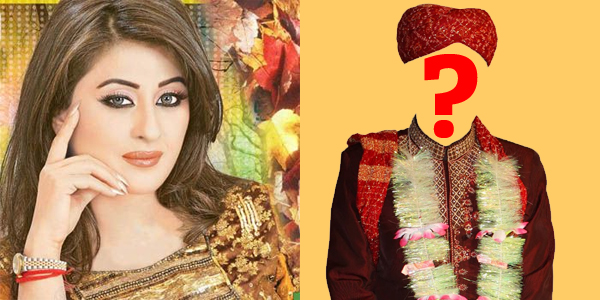 Be it aunties next door or morning show hosts, weddings are on their minds. The team of Good Morning Zindagi morning show thought to stand out by finding a suitor for film actress Laila. Potential suitors from all walks of lives competed in different rounds to prove themselves best to win Laila’s coveted heart. Weeks of entertainment passed by with an anti-climactic end to it when actress Meera’s brother who wasn’t even a competing suitor conquered Laila’s heart.
http://www.dailymotion.com/video/x2j6vbt
8. Aamir Liaquat’s journey from Aalim Online to Subh e Pakistan
[caption id="" align="alignnone" width="600"]
Be it aunties next door or morning show hosts, weddings are on their minds. The team of Good Morning Zindagi morning show thought to stand out by finding a suitor for film actress Laila. Potential suitors from all walks of lives competed in different rounds to prove themselves best to win Laila’s coveted heart. Weeks of entertainment passed by with an anti-climactic end to it when actress Meera’s brother who wasn’t even a competing suitor conquered Laila’s heart.
http://www.dailymotion.com/video/x2j6vbt
8. Aamir Liaquat’s journey from Aalim Online to Subh e Pakistan
[caption id="" align="alignnone" width="600"]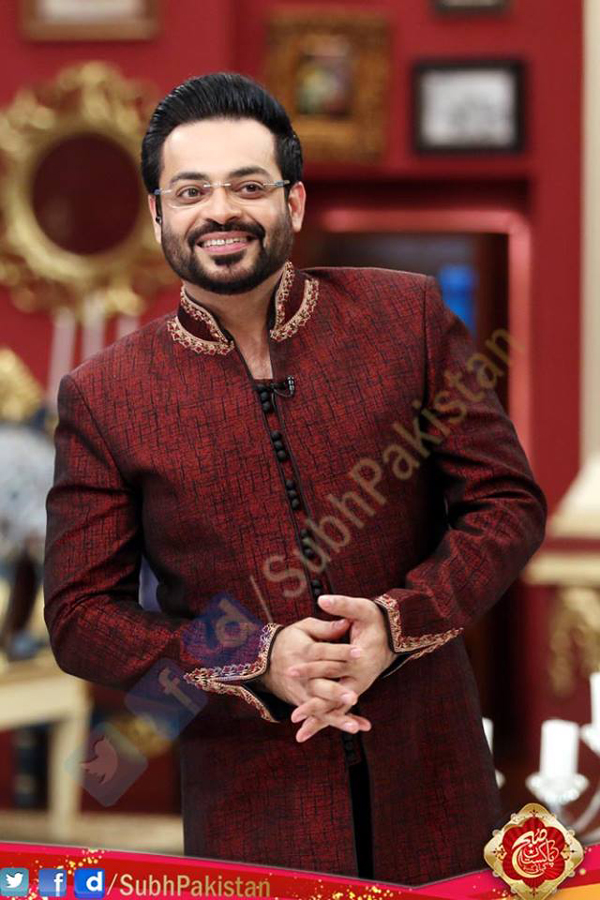 Photo: Facebook[/caption]
Seeing Saahir Lodhi being the only male morning show host in 2015,
Photo: Facebook[/caption]
Seeing Saahir Lodhi being the only male morning show host in 2015, 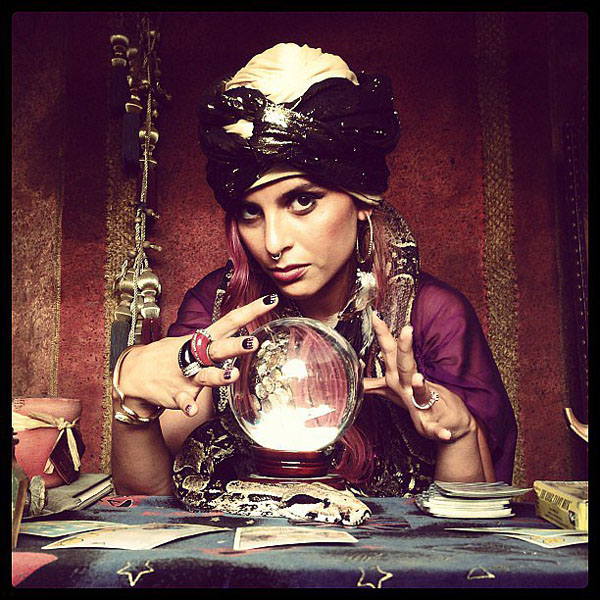 Photo: Sugar Pop[/caption]
Morning shows which are new and want to have a firm footing in this race of TRPs make sure they have a segment of fortune-telling either in form of horoscope, palmistry, tarot card reading or numerology. Our society that already has an external locus of control is given another opportunity to project their shortcomings onto fate; conveniently brushing away responsibilities of their deeds off of their shoulders.
10. Cruising away in Istanbul.
Newest addition to the morning show trend is Sunrise From Istanbul on See TV that is recorded in Istanbul. The show is hosted by Maria Wasti in a boat; where the ambiance is adorned with Turkish singing, Turkish cuisine and a chilly breeze over the rippling water along with a friendly chitchat with the guest without the interruption from live calls or other on-set distractions. This show is simple in its content and the format is contrary to the conventional morning shows.
[caption id="" align="alignnone" width="600"]
Photo: Sugar Pop[/caption]
Morning shows which are new and want to have a firm footing in this race of TRPs make sure they have a segment of fortune-telling either in form of horoscope, palmistry, tarot card reading or numerology. Our society that already has an external locus of control is given another opportunity to project their shortcomings onto fate; conveniently brushing away responsibilities of their deeds off of their shoulders.
10. Cruising away in Istanbul.
Newest addition to the morning show trend is Sunrise From Istanbul on See TV that is recorded in Istanbul. The show is hosted by Maria Wasti in a boat; where the ambiance is adorned with Turkish singing, Turkish cuisine and a chilly breeze over the rippling water along with a friendly chitchat with the guest without the interruption from live calls or other on-set distractions. This show is simple in its content and the format is contrary to the conventional morning shows.
[caption id="" align="alignnone" width="600"]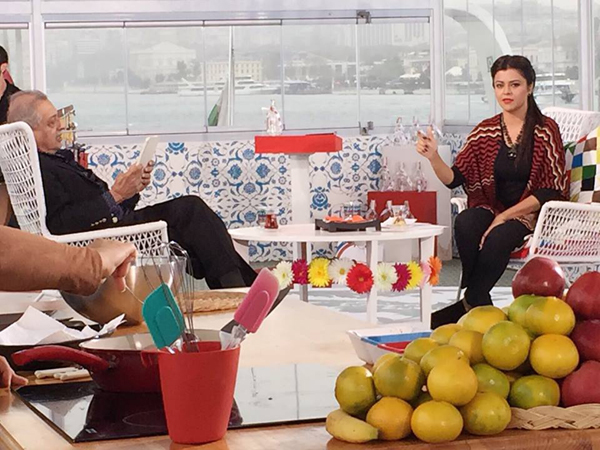 Photo: Facebook[/caption]
[caption id="" align="alignnone" width="600"]
Photo: Facebook[/caption]
[caption id="" align="alignnone" width="600"]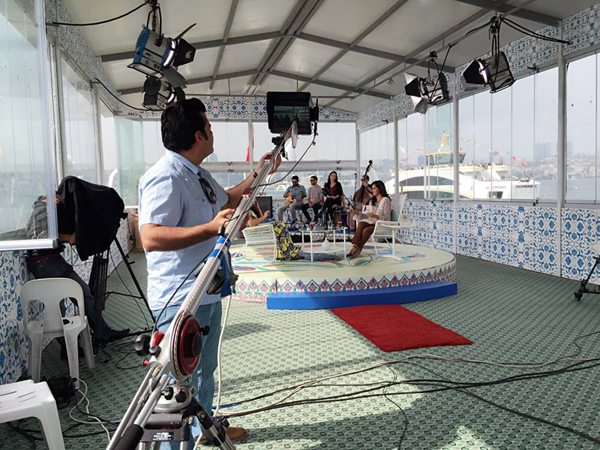 Photo: Facebook[/caption]
[caption id="" align="alignnone" width="600"]
Photo: Facebook[/caption]
[caption id="" align="alignnone" width="600"]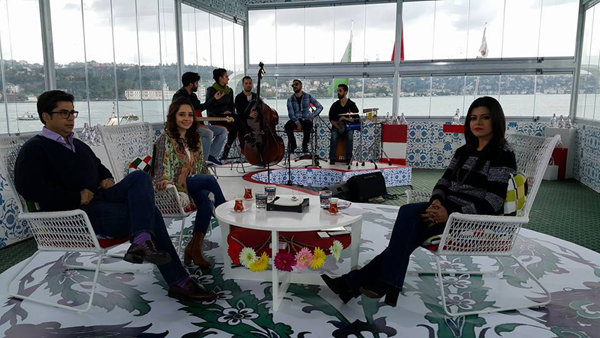 Photo: Facebook[/caption]
[caption id="" align="alignnone" width="600"]
Photo: Facebook[/caption]
[caption id="" align="alignnone" width="600"]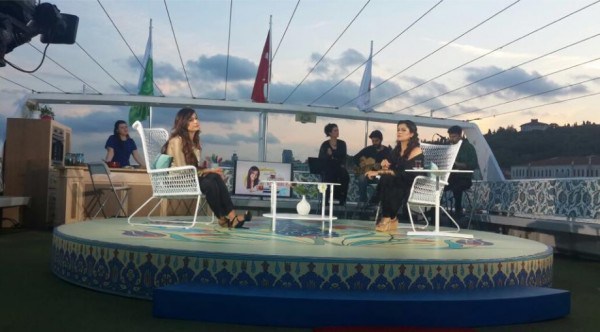 Photo: Facebook[/caption]
Here is a quick list of morning shows of 2015 that were somewhat similar in terms of themes and content:
Subh e Pakistan - Amir Liaquat Hussain
[caption id="" align="alignnone" width="600"]
Photo: Facebook[/caption]
Here is a quick list of morning shows of 2015 that were somewhat similar in terms of themes and content:
Subh e Pakistan - Amir Liaquat Hussain
[caption id="" align="alignnone" width="600"]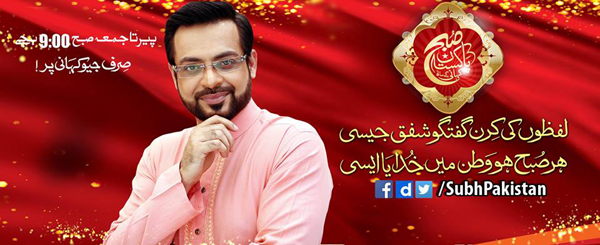 Photo: Facebook[/caption]
Subha Ki Kahani - Madiha Naqvi
[caption id="" align="alignnone" width="600"]
Photo: Facebook[/caption]
Subha Ki Kahani - Madiha Naqvi
[caption id="" align="alignnone" width="600"]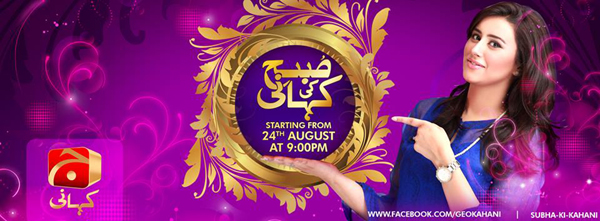 Photo: Facebook[/caption]
Utho Geo Pakistan - Bushra Ansari
[caption id="" align="alignnone" width="600"]
Photo: Facebook[/caption]
Utho Geo Pakistan - Bushra Ansari
[caption id="" align="alignnone" width="600"]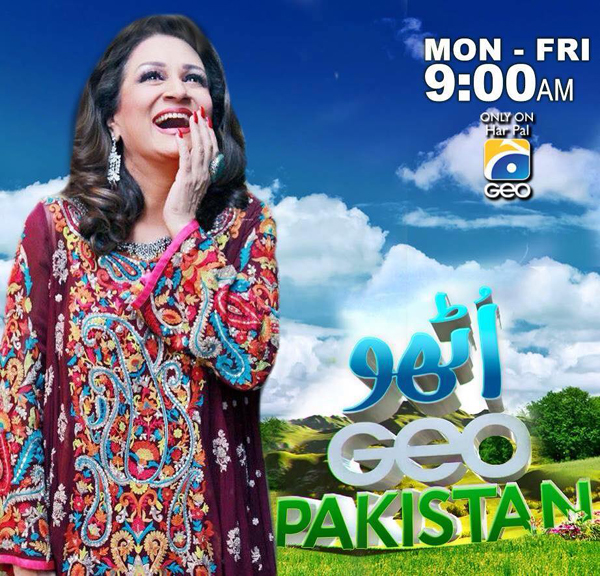 Photo: Facebook[/caption]
Sitaray ki Subha- Shaista Wahidi
[caption id="" align="alignnone" width="600"]
Photo: Facebook[/caption]
Sitaray ki Subha- Shaista Wahidi
[caption id="" align="alignnone" width="600"]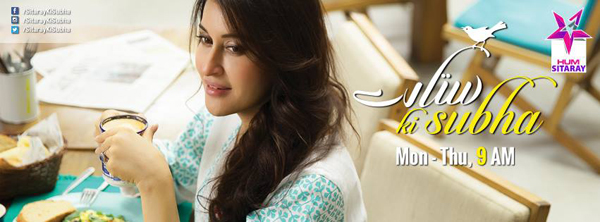 Photo: Facebook[/caption]
Good Morning Pakistan- Nida Yasir
[caption id="" align="alignnone" width="600"]
Photo: Facebook[/caption]
Good Morning Pakistan- Nida Yasir
[caption id="" align="alignnone" width="600"]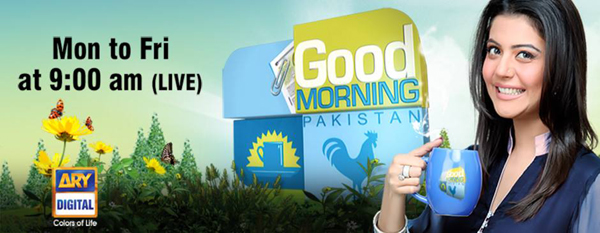 Photo: Facebook[/caption]
Nadia Khan Show- Nadia Khan
[caption id="" align="alignnone" width="600"]
Photo: Facebook[/caption]
Nadia Khan Show- Nadia Khan
[caption id="" align="alignnone" width="600"]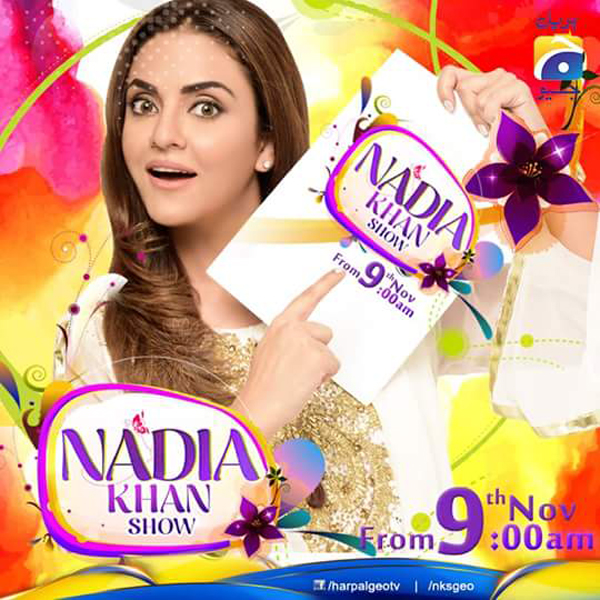 Photo: Facebook[/caption]
Jago Pakistan Jago- Sanam Jung
[caption id="" align="alignnone" width="600"]
Photo: Facebook[/caption]
Jago Pakistan Jago- Sanam Jung
[caption id="" align="alignnone" width="600"] Photo: Facebook[/caption]
The morning show with Sanam Baloch- Sanam Baloch
[caption id="" align="alignnone" width="600"]
Photo: Facebook[/caption]
The morning show with Sanam Baloch- Sanam Baloch
[caption id="" align="alignnone" width="600"]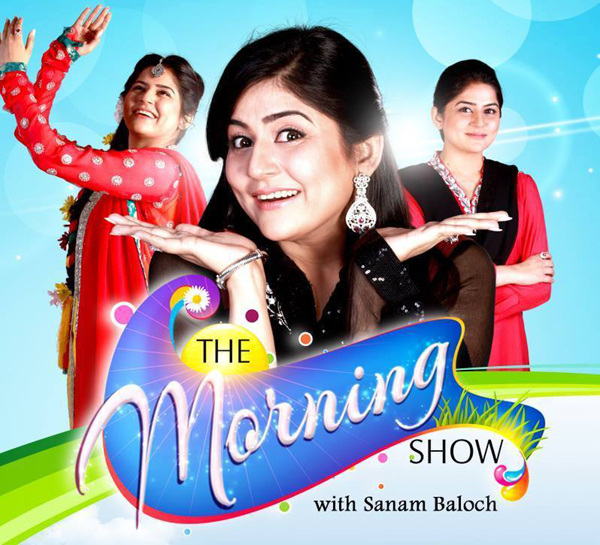 Photo: Facebook[/caption]
Satrungi - Javeria Saud
[caption id="" align="alignnone" width="600"]
Photo: Facebook[/caption]
Satrungi - Javeria Saud
[caption id="" align="alignnone" width="600"]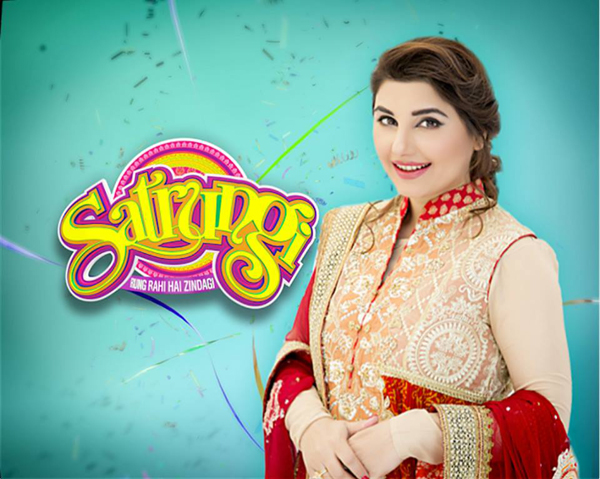 Photo: Facebook[/caption]
ATV Morning with Farah
[caption id="" align="alignnone" width="600"]
Photo: Facebook[/caption]
ATV Morning with Farah
[caption id="" align="alignnone" width="600"]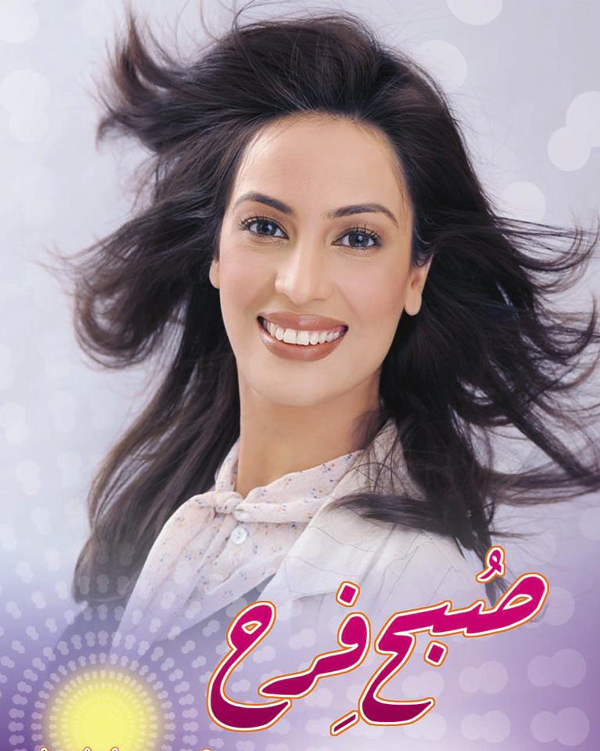 Photo: Facebook[/caption]
Morning with Juggun
[caption id="" align="alignnone" width="600"]
Photo: Facebook[/caption]
Morning with Juggun
[caption id="" align="alignnone" width="600"] Photo: Facebook[/caption]
Photo: Facebook[/caption]
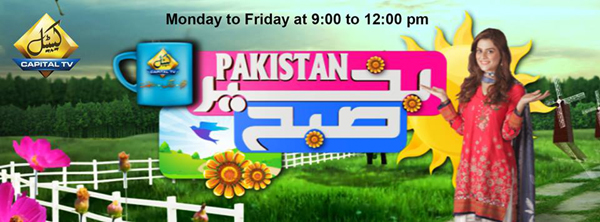 Photo: Facebook[/caption]
Subah Savery Samma k saath- Saahir Lodhi
[caption id="" align="alignnone" width="600"]
Photo: Facebook[/caption]
Subah Savery Samma k saath- Saahir Lodhi
[caption id="" align="alignnone" width="600"] Photo: Facebook[/caption]
And that’s the wrap folks! Here is to hoping that year 2016 is a year of improvement, rational content and moving-forward but not that of stagnation for the morning
Photo: Facebook[/caption]
And that’s the wrap folks! Here is to hoping that year 2016 is a year of improvement, rational content and moving-forward but not that of stagnation for the morning


 Photo: Cricket Addictors Facebook page.[/caption]
Shahid Afridi, who
Photo: Cricket Addictors Facebook page.[/caption]
Shahid Afridi, who 